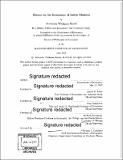Essays on the economics of labor markets
Author(s)
Bartik, Alexander W. (Alexander Wickman)
DownloadFull printable version (28.15Mb)
Other Contributors
Massachusetts Institute of Technology. Department of Economics.
Advisor
David H. Autor, Amy Finkelstein and Michael Greenstone.
Terms of use
Metadata
Show full item recordAbstract
This thesis consists of three chapters on the economics of labor markets. Each chapter explores an aspect of the distributional consequences of labor market shocks due to changes in trade, regulations, or technology. The first chapter investigates the extent to which geographic variation in wage growth reflects workers' incomplete arbitrage of changing job opportunities in different locations, industries, and occupations. Without moving costs, worker adjustment to changes in labor demand would eliminate differential earnings effects between directly exposed workers and others in the same skill group. I find evidence against this full-mobility benchmark, estimating that exposure to trade with China reduces earnings of non-college educated workers in exposed Commuting Zones (CZs) by 4%, and fracking increases earnings of the original residents of exposed CZs by 7%. I estimate a model of location, sector, and occupation choice to quantify the costs that rationalize this incomplete arbitrage. Simulations show that halving these moving costs would have reduced the effect of exposure to trade with China by 35%. In the second chapter, Scott Nelson and I study recent bans on employers' use of credit reports to screen job applicants. Exploiting geographic, temporal, and job-level variation in which workers are covered by these bans, we find that the bans reduced job-finding rates for blacks by 7 to 16 log points, and increased separation rates for black new hires by 3 percentage points. We interpret these findings in a statistical discrimination model in which credit report data provides employers with a higher precision signal of workers' skills, compared to employers' prior beliefs and knowledge about workers' skills; this signal has particularly strong effects on blacks' employment outcomes. In the third chapter, Janet Currie, Christopher Knittel, Michael Greenstone, and I investigate the local welfare consequences of hydraulic fracturing. Exploiting geological and temporal variation, we find that allowing fracking leads to improvements in a wide set of economic indicators. At the same time, estimated willingness-to-pay (WTP) for the decrease in local amenities is equal to $1000 to $1,600 per household annually. Overall, we estimate that the WTP for allowing fracking equals $1,300 to $1,900 per household annually.
Description
Thesis: Ph. D., Massachusetts Institute of Technology, Department of Economics, 2017. Cataloged from PDF version of thesis. Includes bibliographical references (pages 275-289).
Date issued
2017Department
Massachusetts Institute of Technology. Department of EconomicsPublisher
Massachusetts Institute of Technology
Keywords
Economics.